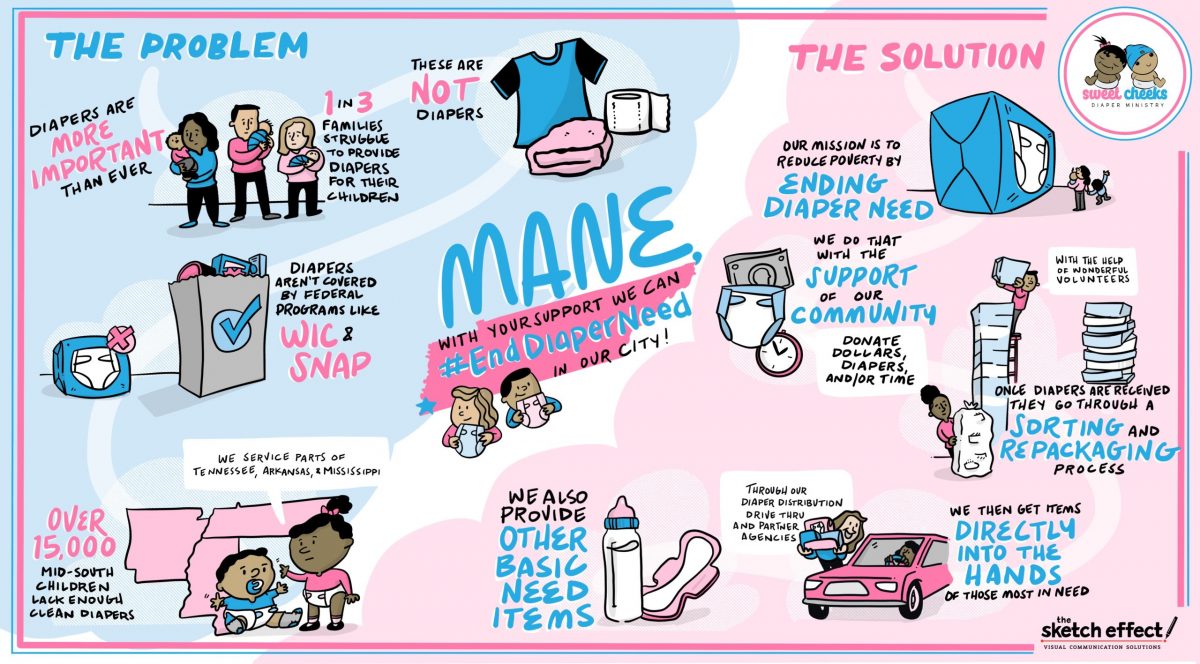For families living in poverty, the reality of having a newborn sometimes comes with hard decisions such as having to choose among putting food on the table, paying rent, or buying diapers.
According to Cori Smith, founder and executive director of the Sweet Cheeks Diaper Ministry, many families will opt for food and rent, leaving them to use items such as t-shirts or towels in place of diapers or leaving the child in diapers for longer than needed.
Sweet Cheeks, which was started in 2014, was born out of Smith’s personal experience. Smith said that during her first pregnancy she became very sick to the point that she couldn’t work, which resulted in her losing her job shortly before giving birth. Her husband was then laid off shortly after Smith had her baby.
Luckily the Smiths had family helping them out, but they also relied on social services such as food banks. Smith said these services were able to help them out with pretty much everything except for diapers.
“There was not a single organization in the city, at that time, that was providing diapers for families,” Smith said.
Once Smith got back to working and on her feet, she began to lay the groundwork for Sweet Cheeks. Smith said they initially started to do diaper drives once a year, where they would donate diapers to the agencies that did not have them. However, in 2018, Smith said she would receive constant phone calls from families inquiring about diapers.
“So maybe this is something that I need to do all the time instead of once or twice a year,” said Smith. “So in 2018, we got our 501(c)(3), and we’ve been going non-stop since.”
The mission of Sweet Cheeks is to “reduce poverty by ending diaper need,” which Smith said goes back to impoverished families having to make hard decisions when it comes to taking care of a newborn and other necessities.
“For families that are living in poverty, they often have to choose, with what little income they have, they have to make a choice on what their money is going to be spent on. Whether it’s rent, groceries, transportation, medical, and then when you have a baby it’s baby supplies,” said Smith. “Oftentimes, diapers are the choice they don’t choose,” said Smith.
Smith said that since most of these families cannot afford diapers, they also cannot send their child to daycare, since you must send diapers with your child. This means that most families cannot work or go to school, and Smith said this causes the cycle of poverty to continue.
“That’s where we step in,” said Smith. “If we can alleviate some of that burden of providing those basic essentials for the child, then you can use that money to pay rent or send your child to daycare so you can go to work.”
While Smith and her team give out diapers through diaper distribution drives, they also donate period supplies for school-age girls, women, and anyone who menstruates.
According to Smith, one in four girls report that they miss school due to not having period supplies. Through 901 Period, a program of Sweet Cheeks Diaper Ministry, Smith and her team make sure to provide monthly supplies to those in need, while also working with certain schools to make sure their supply closets are stocked with pads and other feminine products. Adults can also reach out to Sweet Cheeks for adult diapers as well.
Smith said they do not ask those seeking help for income or ask for them to “jump through hoops,” just to receive help.
“If someone is already struggling, you don’t want to make them feel worse,” said Smith.
Sweet Cheeks not only services Tennessee, but also Mississippi and Arkansas. According to Smith, they are sometimes the closest resource for families, especially those living in rural areas. Smith also said that some of those counties are not being served whatsoever.
“Because there aren’t those resources for them to go to, we are their one-stop-shop for those items,” said Smith. “Even those families who get food stamps — you can’t buy diapers with that.”
Smith said that they have close to 300 to 400 families that reach out to them each month, which proves that the need is there.
“If I didn’t think there was a need, I wouldn’t do it,” said Smith. “Going on 10 years, I would have hoped by now that we would have had something else for the families, but right now there isn’t. So that’s what keeps us going, because our government, our state, our cities — they’re not helping us provide these items for these families. So it’s up to us.”
